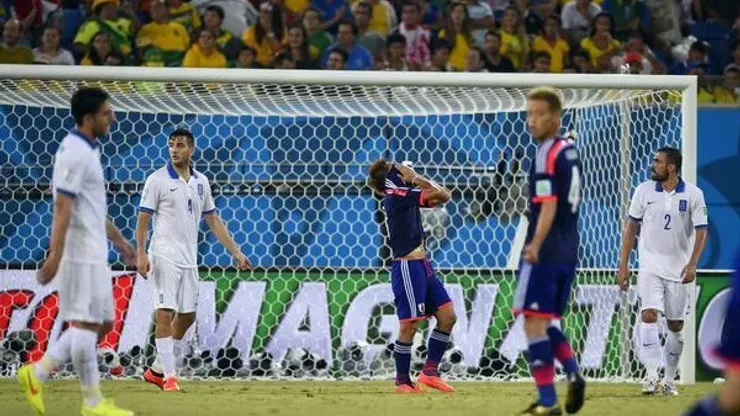The second 0-0 result of the World Cup will be seen as a massive chance blown to get three points by Japan, who enjoyed a one man advantage for the best part of an hour and dominated possession. Greece defended resolutely but could have easily snuck away with a victory had they converted their chances.
The lack of cutting edge in both sides was evident throughout the match. While the draw was not lifeless, the play in the attacking third was poor.
As expected, Greece lined up with Konstantinos Mitroglou as the central striker flanked by the diminutive Fetfatzidis and Samaras, who was the only one of the front three retained from the starting line-up against Colombia. In defense, Fernando Santos kept faith in the central pairing of Kostas Manolas and Sokratis Papastathopoulos whilst Katsouranis was entrusted to pull the strings ahead of them.
The greatest surprise was, by far, Japan Manager Alberto Zaccheroni’s decision to start Shinji Kagawa on the bench as the attacking quartet of Honda, Okazaki, Okubo and Osako were preferred. Yamaguchi partnered Hasebe in midfield as there was no placed for Japan’s most capped player, Endo, in the starting eleven.
From the beginning, it was quite clear that Greece were happy to soak in the pressure and capture Japan on the break. The Asians’ main threat during the first half came from the forward runs of the left wingback Nagatomo and the patient build-up play of their front quartet.
After ten minutes, Kone embarked on a mazy run which ended in a central shot easily dealt with by Kawashina. Osaka and Okubo were both unable to significantly test Karnezis in the Greek goal from good shooting areas whilst Honda had a free-kick from just outside the box parried away.
Mitroglou’s miserable past few months continued as he succumbed to injury with 10 minutes of thr first half remaining after Hasebe seemed to accidentally hit his right hip area with his elbow. Things went from bad to worse for Greece as their captain for the day. Katsouranis was sent off for a second bookable offence. Karagounis was promptly introduced to take up his position in the middle of the park.
The second half started with Samaras trying to catch the Japan keeper off his line from kick-off but his effort went well wide. Kagawa’s introduction after 58 minutes was met with cheering from the Japan fateful. On the hour mark, Kawashima did well to parry a headed shot from Gekas who had entered the field of play in Mitroglou’s place.
Kagawa’s first real impact on the game came soon after as he executed a pinpoint pass over the whole Greek defense to release Uchida, only for the latter’s cross to be poorly met by Okubo a few yards from goal. Time and time again, Japanese attacks were thwarted by a resilient defense – reminiscent of the European Championship winning team of 2004 – and good goalkeeping.
Zaccheroni refused to play with more than one central striker as the second half progressed as Greece, aided by Salpingidis’ introduction, defended with two banks of four in a 4-4-1 formation which proved to be effective.
The final result does little to alleviate fears of a first round exit for both teams. However, the Greeks, more so than their opponents, will feel that, in difficult circumstances, they’ve given themselves a chance to fight another day.
200+ Channels With Sports & News
- Starting price: $33/mo. for fubo Latino Package
- Watch Premier League, Women’s World Cup, Euro 2024 & Gold Cup
The New Home of MLS
- Price: $14.99/mo. for MLS Season Pass
- Watch every MLS game including playoffs & Leagues Cup
Many Sports & ESPN Originals
- Price: $10.99/mo. (or get ESPN+, Hulu & Disney+ for $14.99/mo.)
- Features Bundesliga, LaLiga, Championship, & FA Cup
2,000+ soccer games per year
- Price: $5.99/mo
- Features Champions League, Serie A, Europa League & Brasileirāo
175 Premier League Games & PL TV
- Starting price: $5.99/mo. for Peacock Premium
- Watch 175 exclusive EPL games per season






